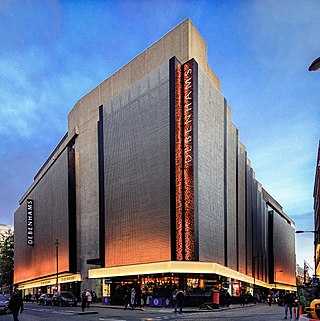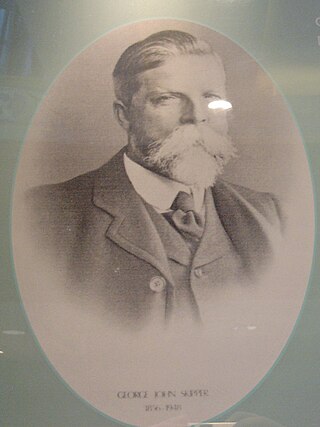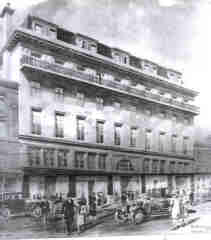Related Research Articles

Debenhams plc was a British department store chain operating in the United Kingdom, Denmark and the Republic of Ireland, and is still operating as a franchise in seven Middle East countries. It was founded in 1778 as a single store in London and grew to 178 locations across those countries, also owning the Danish department store chain Magasin du Nord. In its final years, its headquarters were within the premises of its flagship store in Oxford Street, London. The range of goods sold included middle-to-high-end clothing, beauty, household items, and furniture.

Allders was an independent department store operating in the United Kingdom.

House of Fraser and Frasers are a British department store chain with 26 locations across the United Kingdom and 2 in Ireland, part of Frasers Group. It was established in Glasgow, Scotland in 1849 as Arthur and Fraser. By 1891, it was known as Fraser & Sons. The company grew steadily during the early 20th century and in 1936 began a period of growth through acquisition which would continue for over forty years. House of Fraser Ltd was incorporated in 1941 and first listed on the London Stock Exchange six years later.
Cavendish House was Cheltenham's oldest department store, located on The Promenade. Its establishment was of great significance for Cheltenham's future reputation as a leading shopping centre. Known as 'Cavendish House' from its early days, its name was officially adopted with the registration of a limited liability company in 1883. The store became part of the House of Fraser group in 1970. The store closed in April 2024, after 201 years.

Bentalls was a British department store chain based in Kingston upon Thames. The well regarded department store began as a drapery shop, founded by Frank Bentall in 1867. The business expanded significantly throughout the 20th century and operated a group of department stores in southern England. The company was formerly listed on the London Stock Exchange, but in 2001 was purchased by the private Fenwick group. The Kingston upon Thames store remained as the only store to operate under the Bentalls name until 2023, when it was changed to Fenwick.

The Jarrold Group is a Norwich–based company, founded as Jarrold & Sons Ltd, in 1770, by John Jarrold, at Woodbridge, Suffolk, before relocating to Norfolk in 1823. The Jarrold Group still involves members of the Jarrold family.
Owen Owen was a Liverpool-based operator of department stores in the United Kingdom and Canada. Beginning with a drapery shop in Liverpool, a chain of department stores was built up, often by taking over rival retailers. The company remained under Owen / Norman family control until the 1980s, and the brand ceased to be used in 2007.
Bonds of Norwich was a department store based in All Saints Green, Norwich, England. John Lewis Partnership purchased the business in 1982. The store was renamed John Lewis in 2001.

Swan & Edgar Ltd was a department store, located at Piccadilly Circus on the western side between Piccadilly and Regent Street established in the early 19th century and closed in 1982.
United Drapery Stores, or UDS, was a British retail group that dominated the British high street from the 1950s to the early 1980s.

George John Skipper was a leading Norwich-based architect of the late Victorian and Edwardian period. Writer and poet, John Betjeman said of him "he is altogether remarkable and original. He was to Norwich what Gaudi was to Barcelona" He is regarded as an important Modern Style architect.

Norwich Electric Tramways served the city of Norwich in Norfolk from 30 July 1900 until 10 December 1935.

Palmers Department Store was an independent and family-run department store located in Great Yarmouth, Norfolk. Latterly the company boasted that it was the 'longest established independent department store in the United Kingdom'.
Augustus Frederic Scott (1854–1936) a Norwich-based Architect who was born in 1854 in the Breckland village of Rockland St Peter, Norfolk. His work included both civic and ecclesiastical buildings, in addition to several large hotels and many private commissions.
Drapery Trust formed in 1925 by Clarence Hatry, a notorious British financier. He had made his fortune in speculating on oil stocks, and had convinced investors to promote department stores and bring them under the management of a retail conglomerate. The business was acquired by Debenhams in 1927 and was run as a subsidiary until the 1970s.
Bobby & Co. was a provincial department store group based mainly in seaside towns on the south coast of England. The business operated from 1887 until 1972. During the 1920s it became part of the Drapery Trust, which in turn became a subsidiary of Debenhams.
Buntings was a large department store in Norwich, England, that became part of the Debenhams group.

Plummer Roddis was a chain of department stores based in the South of England which was acquired by the Drapery Trust, before being absorbed by its parent company Debenhams.
The Norwich Blitz refers to the heavy bombing of Norwich and surrounding area by the German Luftwaffe during World War II. The bombings launched on numerous British cities were known as the Blitz.
References
- ↑ "NORWICH SHOPS (4)". joemasonspage. Retrieved 1 November 2014.
- 1 2 3 "Curls of Norwich". Archived from the original on 30 October 2014. Retrieved 1 November 2014.
{{cite web}}: CS1 maint: unfit URL (link) - ↑ Listing Statements of the New York Stock Exchange. Vol. 53. 1928. p. 2.
- ↑ "Footman, Pretty and Company". New Dawn. 1949. p. 534.
- ↑ "Footman, Pretty & Company". The Stock Exchange Official Year-book. 1944. p. 1138.
- ↑ "1940s - 1950s - Jarrold, Norwich, Norfolk" . Retrieved 1 November 2014.
- 1 2 Norwich in the 1950s by Peter Goodrum
- ↑ "End of an era for Debenhams as final shops set to close". BBC News. 5 May 2021. Retrieved 16 May 2021.